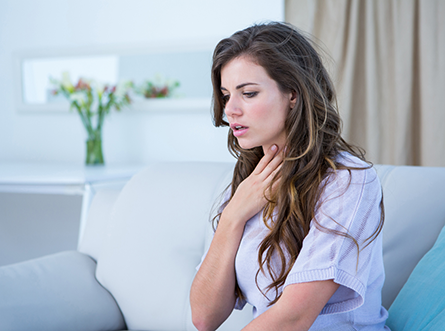Hot summer days and poor air quality can be hard for people with chronic obstructive pulmonary disease (COPD), asthma, pulmonary fibrosis, and other lung conditions. When you put that together with the increased chance of fires, it's important to take extra precautions.
UC Davis pulmonary and air-quality specialists encourage patients with chronic lung disease to check the air-quality index (AQI) each day. You can find the AQI in local newspapers or on the Sacramento Metropolitan Air Quality Management District's Fire and Smoke map.
Government agencies use the AQI to rate the predicted levels of ozone and particulates in the atmosphere. The AQI is on a scale of 0 to 500. Those with lung diseases like COPD need to take extra precautions when the AQI reaches 101, which is considered unhealthy for sensitive groups.
Sign up for our Health Highlights e-newsletter
In addition to watching the weather and AQI reports, here are tips on getting through summer with a lung condition:
- If the AQI is 101 or higher, stay indoors.
- Stay indoors when the temperature reaches 100 degrees. Lung disease and the medications used to treat it can interfere with the body's natural ability to cool down and can increase sensitivities to heat.
- Stay cool. If you don't have air conditioning at home, go to a mall or a friend's house that does. Air conditioning also helps take humidity out of the air, making it easier to breathe.
- Keep window coverings closed during the day. This helps air conditioning units work better.
- Keep in contact with family and friends. Interaction relieves the isolation of being stuck in the house on hot days.
- If your pulmonary rehabilitation program includes exercise therapy, do light exercises in your home with resistance bands.
- Pace yourself when you exercise. It's OK to avoid working yourself too hard on hot days.
- Stay hydrated throughout the day. If you're monitoring your fluid intake for other health-related conditions, talk with your physician about the best hydration options.
- Plan outside activities during the coolest part of the day. If you must be out and about, do so early in the day to avoid the high temperatures.
- Park in shady areas. Never sit or rest in a car parked outdoors or in an enclosure where temperatures can soar.
- Carry an umbrella or floppy hat for instant shade. It's also best to wear loose-fitting clothing made of cotton along with sandals or lightweight socks and shoes.
- Cool off with a fan or mister. You can also put a cool, damp washcloth on the underside of your wrist or on your forehead or neck.
- Remember to take medication in the early stages when you feel your breathing symptoms are getting worse.
- Sign up for daily regional AQI emails, or for current air-quality conditions in specific areas. You can also download the Spare the Air app.
- Above all, know your triggers, monitor your symptoms and be aware of how you feel. Call your physician's office if you have increased shortness of breath. Don't delay getting to urgent care or an emergency department if your symptoms worsen and medication isn't working.




